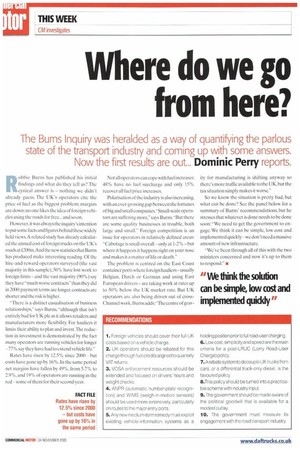Where do we go from here?
Page 26

If you've noticed an error in this article please click here to report it so we can fix it.
The Burns Inquiry was heralded as a way of quantifying the parlous state of the transport industry and coming up with some answers.
Now the first results are out... Dominic Perry reports.
Robbie Burns has published his initial findings and what do they tell us? The cynical answer is — nothing we didn't already guess. The 1..JK's operators cite the price of fuel as the biggest problem; margins are down: no one likes the idea of foreign vehicles using the roads for free... and so on.
However, it was always the inquiry's intention to put some facts and figures behind these widely held views. A related study has already calculated the annual cost of foreign trucks on the LIK's roads at i200m.And the new statistics that Burns has produced make interesting reading. Of the hire-and-reward operators surveyed (the vast majority in this sample), 50% have lost work to foreign firms — and the vast majority (90%) say they have"much worse contracts" than they did in 2000: payment terms are longer, contracts are shorter and the risk is higher.
"There is a distinct casualisation of business relationships," says Burns. "although that isn't entirely had for UK plc as it allows retailers and manufacturers more flexibility. For hauliers it limits their ability to plan and invest.The reduction in investment is demonstrated by the fact many operators are running vehicles for longer —77% say they have had to extend vehicle life."
Rates have risen by 12.5% since 20(X) — but costs have gone up by 169O. In the same period net margins have fallen by 49%, from 5.7% to 2.9%, and 19% of operators are running in the red — some of them for their second year. Not all operators can cope with fuel increases: 48% have no fuel surcharge and only 15% recover all fuel price increases.
Polarisation of the industry is also increasing, with an ever-growing gap between the fortunes of big and small companies."Small-scale operators are suffering more," says Burns."But there are some quality businesses in trouble, both large and small." Foreign competition is an issue for operators in relatively defined areas: "Cabotage is small overall —only at 1-2% —hut where it happens it happens right on your nose and makes it a matter of life or death."
The problem is centred on the East Coast container ports where foreign hauliers—usually Belgian, Dutch or German and using East European drivers — are taking work at rates up to 50% below the UK market rate. But UK operators are also being driven out of crossChannel work.Burns adds:"The centre of grav ity for manufacturing is shifting anyway so there's more traffic available to the UK. but the tax situation simply makes it worse."
So we know the situation is pretty bad, but what can be done? Sec the panel below for a summary of Burns' recommendations, but he stresses that whatever is done needs to be done soon: "We need to get the government to engage. We think it can be simple, low cost and implemented quickly — we don't need a massive amount of new infrastructure.
"We've been through all of this with the two ministers concerned and now it's up to them to respond." •






































































































































































































